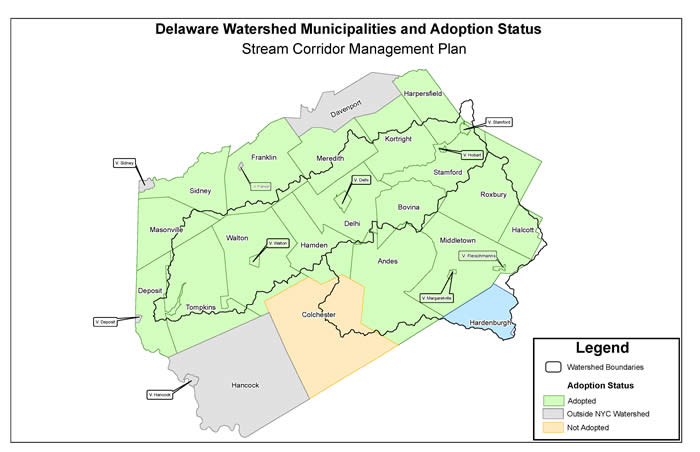Background
Delaware County Soil and Water Conservation District (DCSWCD) along with NYC Department of Environmental Protection (NYC DEP) and Delaware County Planning Department developed two comprehensive Stream Corridor Management Plans (SCMPs) for the West Branch Delaware River (2006) and the East Branch Delaware River (2007). The development of each management plan was guided by project advisory committees consisting of local officials, residents, businesses, and agencies living and working in the watershed. The materials created through this detailed assessment and planning process can now be used as a tool for municipal officials, residents and other interested parties to manage streams consistent with science-based principles.
Funding for projects and programs within the NYC Delaware River watersheds are made available to participating municipalities for construction projects and non-construction programs that implement the goals and objectives of the plans.
Who is eligible for assistance from the Stream Management Grant Program?
Local municipality that has adopted the respective SCMP or a 501c-3 Not For Profit Corporation with a letter of support from a host municipality that has adopted the respective SCMP.
What projects or programs are eligible?
Projects or programs that are located within the Delaware Basin Watersheds and the municipality has adopted the appropriate Stream Corridor Management Plans. The Municipality must have a signed Memorandum of Understanding with the DCSWCD. Projects or programs must follow the Recommendations of the SCMP’s, the East and West Branch Delaware Action Plans, and the Stream Stewardship Principles.
Categories of Funding and Examples
Project Track Categories
* Flood Management: development of flood management planning and response plans; flood recovery assistance; flood management training, including National Flood Insurance Program training.
* Highway Infrastructure Improvement: upgrade undersized culverts; potential cost-share to properly size bridges to avoid channel constriction; potential cost-share to re-align streams upstream/downstream of bridges and culverts; incorporate vegetation into road embankments; utility crossing management; floodplain management of public lands.
* Stormwater Implementation and/or Critical Area Seeding: hydro-seeding of open ditches etc.; implementation of stormwater techniques to retain and/or infiltrate stormwater into ground; wetland enhancement; filter strips; creation of rain garden and/or bioswales.
* Recreation-Based Opportunities or Habitat Enhancements: stream access improvemetns; increasing navigability; development of watershed recreation plans; streamside amenities open to public; public fishing related projects; fisheries improvements and/or habitat engancements (instream and in floodplain).
* General Restoration Projects: any project not covered in the above categories. Such projects may include a gamut of projects from passive restoration to full-scale restoration projects that would provide mulit-faceted benefits to a local community.
* Education/Outreach/Training: workshops; newsletters; public meetings; school programs; stream clean-ups; volunteer plantings; educational kiosks; outreach materials; training programs/opportunites; stream celebration.
* Planning and Assessment: floodplain management; coordinated flood response; technical assistance; land use/open space planning and/or incorporating stream managment into economic development initiatives; creating/enhancing local control through environmental policies; collaborating at the county, regional and local levels supporting watershed communities.


